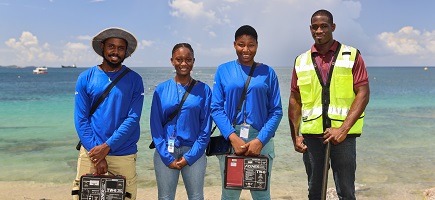
21.12.2023
‘A big job for all of us’
From green energy specialists to data-driven climate adaptation, the agreements struck at COP28 in Dubai have implications for GIZ’s work. We asked Ingrid-Gabriela Hoven, Managing Director of GIZ, to explain why.
Ms Hoven, how would you sum up COP28?
This COP has provided a real boost for efforts to transition towards a more climate-friendly world. I’m delighted that GIZ was able to play a part in making that happen. Thanks to our own specialists, we were able to support the negotiations on the Loss and Damage Fund and the global climate change adaptation goal. We were involved in numerous events with our partners and clients, giving us an opportunity to put forward practical solutions for climate mitigation and adaptation. When it comes to the global competition for ideas, we were able to demonstrate that we are right up there with the key players.
What do you see as the most positive outcomes from this COP?
The final conference document describes the beginning of the end of the fossil fuel era. For me, that is a landmark signal. The international community also decided to triple the use of renewable energy and double the current level of energy-efficiency by 2030.
Those goals leave us with a big job to do! From a global perspective, however, we’re not yet on track to meet them. That’s where GIZ can help by drawing on its long and wide-ranging experience of transforming energy systems. But reaching those ambitious goals will require effort from all those involved.
The results of the first global ‘stocktake’ are more than concerning. We know from those results that the efforts currently being made are not nearly what they should be if we want to limit global warming to 1.5°.
What do you think that transition will look like?
It should be socially just and equitable. That’s what the term ‘Just Transition’ is all about. It means involving all those who are affected in the process right from the start. We need to make sure that we ease the burden on those who don’t stand to benefit from the transition – people who may lose their job or find themselves paying more, for example – and find appropriate ways of compensating them. In concrete terms, that means we have to integrate women and disadvantaged groups and provide social protection for workers and local communities. Training measures need to be more strongly focused on the market for green skills. And all of that has to be funded in ways that are both just and equitable.
How will GIZ contribute to this transition?
40 per cent of our portfolio is linked to climate, energy and biodiversity. That means we have a lot of experience when it comes to collaborating on transformation projects and building resilience. People are always at the heart of what we do. It’s about demonstrating that a just transition is possible and showing how it works on the ground. That’s the path we will continue to follow together with our partners.
We already advise numerous countries in the field of climate adaptation. In fact, that aspect of our work is growing all the time. Looking ahead, for example, we will analyse climate risks as a standard procedure using new digital tools. The results will allow us to take better decisions based on data. We will also be able to coordinate climate mitigation and adaptation measures more effectively between ourselves, allowing us to harness valuable synergies.
A world based on renewables and energy-efficiency will need skilled workers at every level. One of the biggest tasks for us will be to develop skills for a green future.



